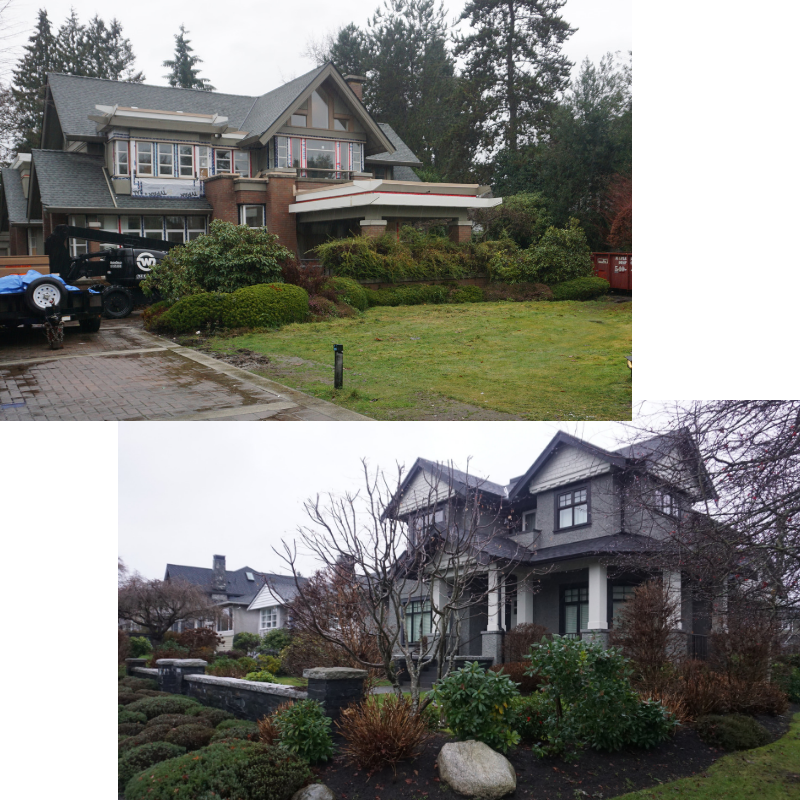
Bob Mackin
The Alouette Correctional Centre for Women is a long way from Mexico, where Meng Wanzhou was headed on Dec. 1.
Canadian police, acting on a request from American counterparts, arrested the 46-year-old after she arrived at Vancouver International Airport from Hong Kong.
The chief financial officer of Huawei Technologies, the Chinese telecom giant that grossed $92 billion last year, finds herself in the provincial jail in Maple Ridge for another weekend while her lawyer fights for her bail to await an extradition hearing.
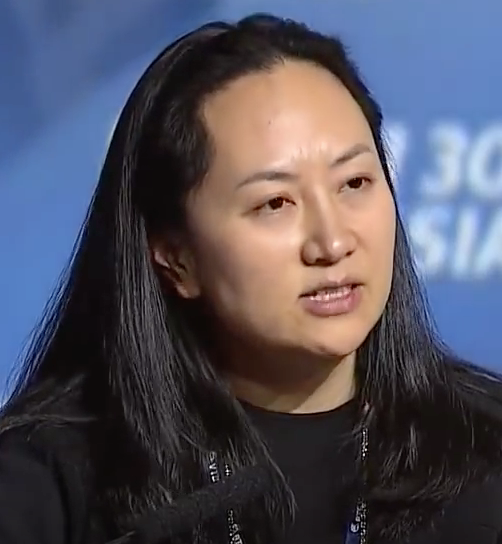
Meng Wanzhou at Russia Calling 2014 (RT)
Unbeknownst to Meng, daughter of multibillionaire Huawei founder Ren Zhengfei, a judge in New York issued a warrant for her arrest on Aug. 22. She is wanted in the U.S. for fraud, after allegedly using an unofficial subsidiary, called Skycom, from 2009 to 2014 to act as a decoy so Huawei could do business in Iran, contrary to U.S. and European Union sanctions.
Meng’s lawyer, David J. Martin, told B.C. Supreme Court Justice William Ehrcke in a Dec. 7 hearing that she will contest the U.S. allegation. In the meantime, he denied that she is a flight risk and he described how she leads a lifestyle that falls within what Vancouverites have come to know as an “astronaut family.”
“Her loyalty to her father, to Huawei and to China is such that she would never embarrass those entities, which has been said over and over again that Huawei is a national champion of China,” Martin told the court. “She would not flee, she would be an outcast in China if she did, she tells me her father would not recognize her, her colleagues would hold her in contempt, she would be a pariah.”
Martin said Meng — also known as Sabrina Meng and Cathy Meng — came to Vancouver 15 years ago and has a 10-year-old daughter with her husband, Xiaozong Liu. They bought houses in 2009 and 2016, in Dunbar and Shaughnessy, respectively. Only Liu’s name, however, is on the land title for the $16.3 million Matthews Avenue mansion (upper photo) and $5.6 million West 28th Avenue mansion (lower photo). Liu’s profession is identified on one deed as an “investor” and a “marketing developer” on the other. Both mansions are mortgaged by HSBC, the same bank Meng is accused of deceiving. Liu ignored a reporter who asked him for comment during the court’s lunch break.

Huawei CFO Meng Wanzhou’s husband, Liu Xiaozong, is the only person listed on the registrations for Vancouver mansions on Matthews (upper) and West 28th (lower). (Mackin)
The land registry says Liu bought the Matthews mansion in May 2016. It is on the same side of the street as the former William Shelly mansion, the official residence of United States Consul General since 1946. Google Maps measures the distance between the two properties at just 47 metres. The Liu house is under renovation by Trasolini Construction.
Strategically located, Chinese-owned real estate became a national security issue recently in New York City.
In August, the Wall Street Journal reported that the Committee on Foreign Investment in the United States forced the HNA Group Ltd. to sell a Manhattan building four blocks from Trump Tower. One of the HNA tenants was a New York Police Department office involved in protecting President Donald Trump. HNA bought 90% interest in 850 Third after Trump declared his candidacy in 2015, but before Trump won the election in 2016.
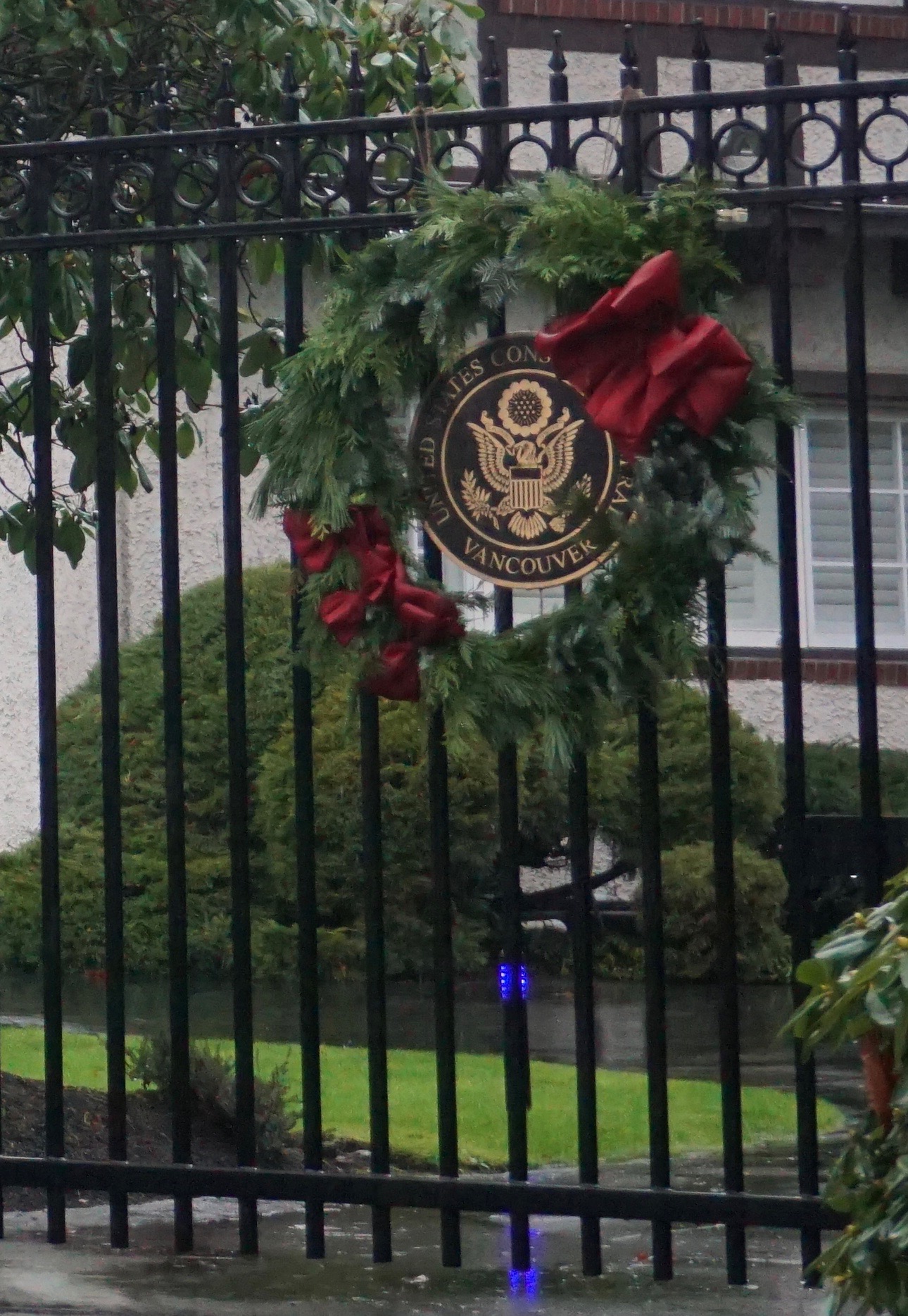
Gate of the United States Consul’s Vancouver residence, near the Liu Xiaozong-registered mansion (Mackin)
As for the other Liu-registered house, it is on the corner of West 28th and Crown. Vancouver Police attended the residence on Dec. 9 after a 9-1-1 call about a break-in at 5:30 a.m. Suspects fled the area after being challenged by someone in the house, Const. Jason Doucette told theBreaker. No one was injured or arrested.
“Officers have collected evidence from the scene and will make attempts to identify those responsible for the break-in,” Doucette said.
Meng had Canadian permanent resident status
Meng, Liu and their daughter normally live in Shenzhen, the world headquarters of Huawei. She also has sons aged 14, 16 and 20 from a previous marriage. One of them lives with his father in Hong Kong, while another attends private school in the Boston area.
Court heard that Meng used to be a permanent resident of Canada, but that status expired in 2009. She also held BC ID, CareCard and social insurance number identification cards. She now tries to spend two-to-three weeks every summer in Vancouver. Among the evidence Martin introduced were family photos, including one from August of this year in a Vancouver park with Liu’s parents.
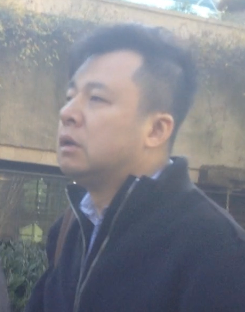
Xiaozong Liu, Meng Wanzhou’s husband, outside the Law Courts (Mackin)
Federal Crown prosecutor John Gibb-Carsley said Meng is a flight risk, because of her extreme wealth and her habit of avoiding travel to the U.S. since Huawei was subpoenaed by a grand jury in April 2017. No amount of bail can have pull, because Meng has the resources to flee, he said. China, which she calls home, has no extradition treaty with Canada or the U.S.
“The allegation is Skycom is Huawei,” he said. Meng allegedly lied to banks about the subsidiary, in order to move money from Huawei out of countries subject to U.S. and EU sanctions, like Iran, Syria and Sudan.
Gibb-Carsley pointed to a Reuters story in early 2013 that revealed Huawei’s control of Skycom, and how it attempted to import U.S. computer equipment into Iran. He told the court that several banks asked Huawei after that story whether the allegations about Skycom and Iran were true.
“Ms. Meng, herself, made misrepresentations to those financial institutions in a form of damage control to the Reuters article,” he said.
The victim banks were “induced into carrying out transactions that they otherwise would not have completed; this violated the bank’s internal policies, potentially violated U.S. sanction laws and exposed the banks to risk of fines and forfeitures.”
If extradicted and tried in the U.S., Meng could face up to 30 years in jail.
Martin, however, said Meng has had no reason to travel to the U.S. AT&T reneged on an agreement to carry Huawei consumer products. Amid a trade war with China, the U.S. government banned bidders from using Huawei products.
“An entity would have to be tone deaf to not understand the the U.S. had become a hostile place for Huawei to do business and, in essence, the company had abandoned the U.S. market,” Martin said. “Not only Ms. Meng, but the other executives that the U.S. government points to that no longer travel to the U.S. have little reason to travel there.”
Martin proposed Meng would put her Vancouver real estate and cash forward as a surety, to ensure she doesn’t flee Canada while awaiting an extradition hearing. She would surrender her Hong Kong and China passports and welcome RCMP for random check-up visits while living in the Dunbar house under a round-the-clock surveillance regimen.
A publication ban was cancelled early in the hearing in the heavily secured courtroom built for the Air India bombing trial in 2002. Nearly all the 150 seats were filled, mainly by media from around the world.
Two men from the Chinese consulate sat in the front row, on the other side of an aisle from where Liu sat with Huawei executives, behind the prisoner’s dock. Liu and Meng gestured at each other when she entered, in relatively good spirits. Meng, dressed in a drab, dark green prison sweatshirt and pants, took sips from a paper cup while scribbling notes on a pad during the legal arguments.
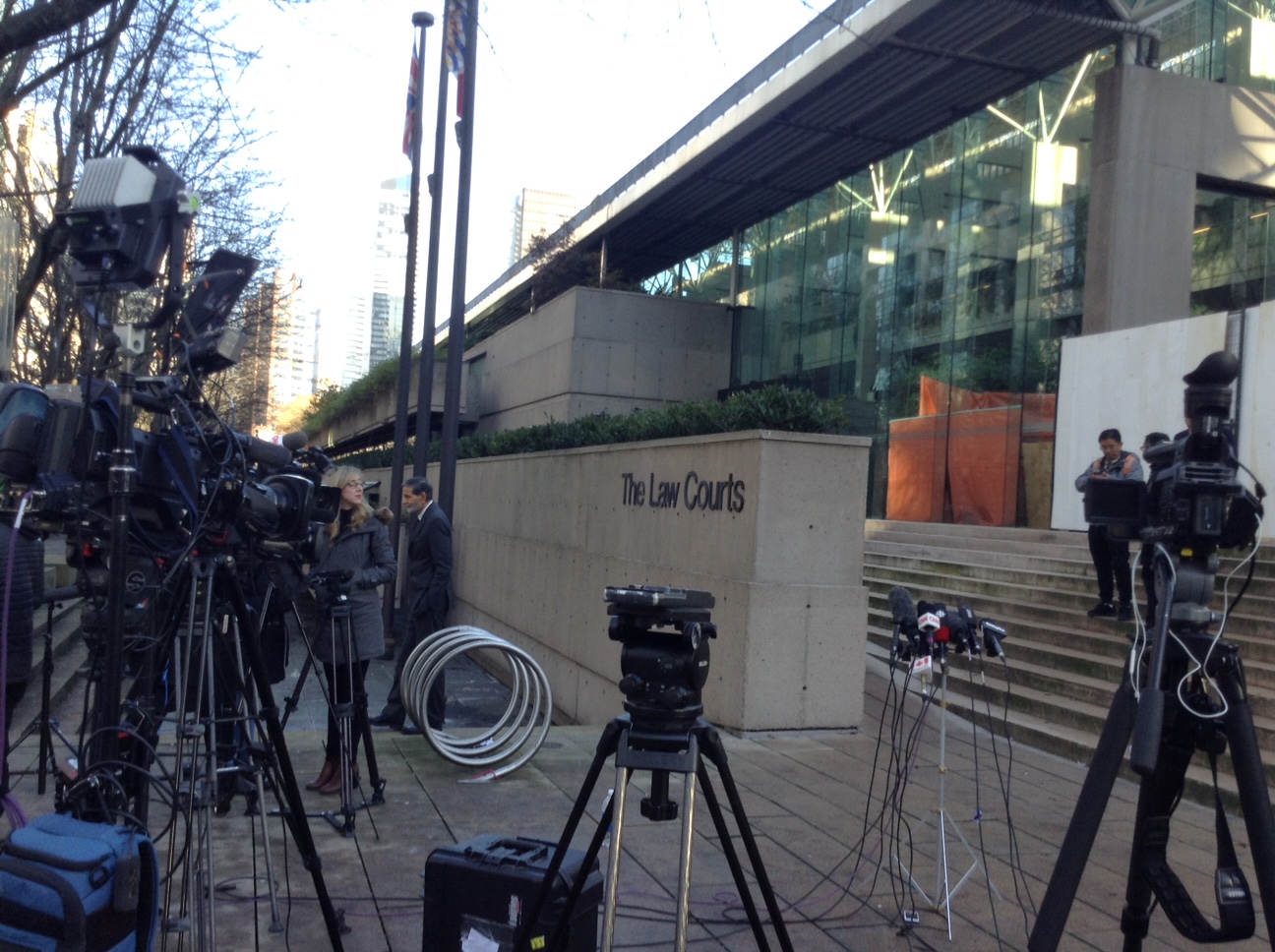
Outside the Law Courts Dec. 7 during the Meng Wanzhou bail hearing (Mackin)
The hallway was filled with dozens of other curious onlookers who followed the proceedings on large TV screens. Court sheriffs kept busy warning exuberant Mandarin speakers to stop using their mobile phones to snap phtographs in the courthouse. Tech-savvy and fashionably dressed Chinese women in their 20s and 30s crowded the area around the doorway to get a glimpse of Meng, a rare female executive in a country where the inner circle of President Xi Jinping’s Communist administration is all male and few women occupy C-suites at the largest companies.
Court heard that Meng worked her way up from being a secretary at Huawei in 1993 to the deputy chair that she is today.
Unlike the U.S., where Huawei is feared to be part of China’s vast spying infrastructure, Canadian telecoms have embraced the aggressive marketer. Huawei is a research and development partner of Telus and funds a 5G development lab at the University of B.C.
Huawei is even a major advertiser on one of the nation’s dearest cultural institutions, Hockey Night in Canada.
Support theBreaker.news for as low as $2 a month on Patreon. Find out how. Click here.











